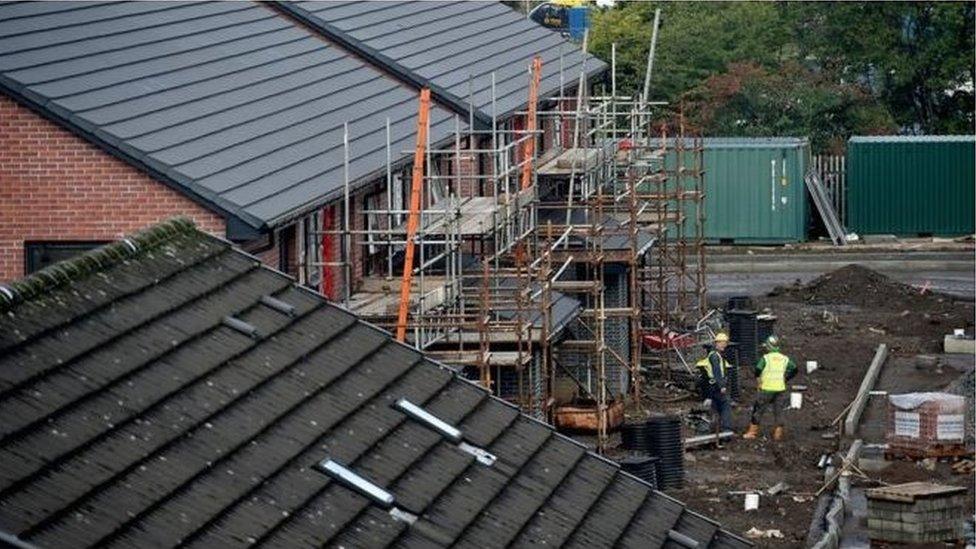New affordable homes 'can build recovery from pandemic'
- Published
- comments

Charities say new house building boosts jobs, improves health and reduces poverty
Building affordable housing should be a key part of Scotland's recovery out of the recession caused by the Covid-19 pandemic, a report has said.
Housing and social research charities said new house building creates jobs, improves health and reduces poverty, external.
Their report said Scotland required 53,000 affordable homes to be delivered between 2021-26.
Their construction would create about 200,000 jobs, boosting the economy by £2bn and raising £100m in tax revenues.
But the Scottish Federation of Housing Associations (SFHA) also pointed to the social benefits of increasing the provision of affordable housing which includes reducing child poverty and homelessness and improving physical and mental health.
And it said the pandemic had brought the limitations of space in domestic settings into sharp focus, meaning the design of new homes must be a central part of the recovery programme.
The Scottish government said it had delivered more than 95,000 affordable homes since 2007, of which more than 66,000 were for social rent.
Sally Thomas, chief executive of the SFHA said social landlords helped the Scottish government meet policy objectives set out in the National Performance Framework, external on a range of issues such as in health and social care, poverty and homelessness.
She said: "Due to the effects of Covid-19, now, more than ever, SFHA is calling on the Scottish government to recognise the social and economic contribution of housing associations and co-operatives and make building affordable housing a key part of Scotland's recovery."

What is the need for affordable social housing?
SFHA said that without an ambitious building programme over the lifetime of the next Scottish Parliament, it would be more difficult for people to access affordable housing. It said:
The number of households in Scotland is growing at a steady rate, as is the general population, so more houses are needed
After years of decline and stagnation house prices are rising, and look set to reach their previous peak of 2007 before the banking crisis
Market rents have increased steadily as the social rented sector has contracted and many households struggle to access home-ownership
House building levels are below their peak of 2007 with social housing completions falling 44% from 2010-14 before rising slowly
Many existing social rented homes have been demolished or lost through the Right to Buy scheme
Homelessness remains a pressing issue for many local authorities, even though the number of households assessed as homeless has fallen since 2010

Following research carried out by SFHA and Shelter Scotland in 2015 the Scottish government set a target of building 50,000 new affordable homes between 2016-20, including 35,000 for social rent.
The programme was on track to be delivered before the coronavirus pandemic hit.
New research in May 2020 called on the government elected in the 2021 Holyrood poll to deliver 53,000 affordable homes over the next parliament, and to commit to a capital investment programme of £3.4bn over five years.
This, it said, would boost employment in the construction and allied sectors, raising tax take and giving a value to the Scottish economy of around £2bn.
'Significant returns'
Kenneth Gibb, director of the UK Collaborative Centre of Housing Evidence, said the evidence of the benefits of social landlords was well-established.
He said: "This should reassure stakeholders - communities, government and lenders alike - that such investment and activity offers significant economic and social returns."
Dr Matt Lowther, head of place and equity at Public Health Scotland, said housing was a critical public health issue, with factors such as the condition of homes, their energy efficiency, accessibility and affordability making significant differences to physical and mental health.
And he said the design of new homes played a crucial role.
"The Covid-19 pandemic has also brought the limitations of space standards and amenity levels into sharp focus, highlighting that the design and quality of our homes also needs to be a central part of any housing and placed-based strategy in the recovery programme," he said.
"This research underlines the contribution that social housing has, and can, continue to have in reducing inequalities, and, as providers of social housing, local government and housing associations will make a significant contribution to our recovery from the current public health crisis."
Housing Minister Kevin Stewart said: "We have committed a record investment of more than £3.5bn in affordable housing over this parliamentary term to deliver our ambitious commitment of delivering 50,000 affordable homes - 35,000 of which are for social rent.
"That investment in housing, will, on average, leverage economic output in the region of £1.4bn per year, supporting around 10,000 to 12,000 jobs per annum in the construction and related industries."